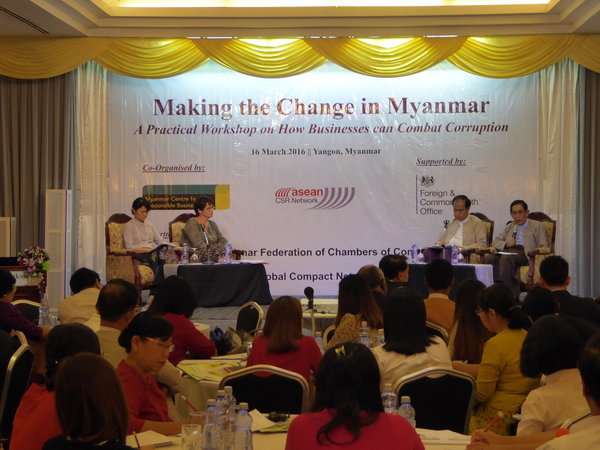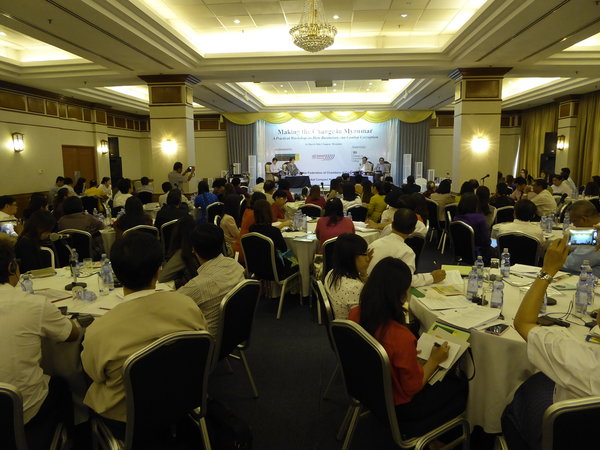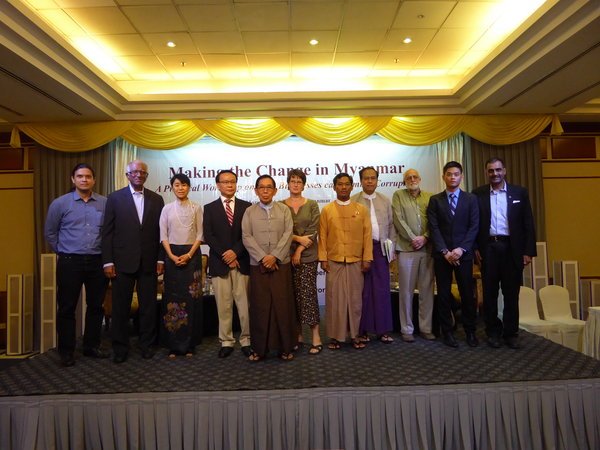Insights from the anti-corruption workshop in Myanmar
ASEAN CSR Network (ACN), together with the Myanmar Centre for Responsible Business, recently held a workshop in Yangon with the theme “Making the Change in Myanmar: A Practical Workshop on How Business can Combat Corruption.” The workshop was supported by the UK FCO Prosperity Fund and held in partnership with UMFCCI and Global Compact Network Myanmar. Over 120 people attended, mostly from the private sector.
ACN’s programme director, Mr. Jerry Bernas, shared his insights gathered from the discussions.
Panellists from left: Ms. Khine Khine Nwe, UMFCCI; Ms. Vicky Bowman, MCRB; U Tint Swai, UMFCCI; Prof Aung Tun Thet, Economic Advisor to the President & Chair of Global Compact Network Myanmar
First, there was a change in tone at discussions held during this workshop compared to the first workshop on business and corruption held in Myanmar in 2014. In 2014, people spoke in generalities and seemed cautious to cite clear examples of corruption that they have experienced. However, at this workshop, participants spoke more freely and candidly.
MCRB ran a live quiz/survey asking about opinions and experiences of corruption, and participants gamely shared their views. For example, there was a lively discussion on whether making payments for express government service “with a receipt” constituted bribery, or if paying cash to a journalist for press coverage was corruption. In a mini-survey, participants also shared which government agencies they were most likely to encounter corruption and bribery, whether as individuals or business. This showed that there is now greater acknowledgment of the everyday dilemmas faced by both individuals and companies in Myanmar. And the fact that they are now considered dilemmas, and not just as an accepted fact of life where you have no real choice, is a major step in the right direction.
Delegates at the workshop
Second, speakers from multinational companies acknowledged that it was easier for them to tackle corruption compared to local companies. Mr. Jerry Bernas opined: “This was somewhat surprising to me as I thought the pressure on MNCs would be greater due to MNCs having fewer personal connections and could be seen as an easy target for corruption. However, they cited the fact that since the policies and guidelines governing their global operations were clear and well-developed, and gave little to no room for adjustment to local context, they had no choice but to follow it and make it work.”
Their size also allowed them to take a more long-term approach and withstand possible inconveniences or delays related to saying no to corruption and bribery. Coca-Cola gave the example of how some of their delivery trucks experienced delays when refusing to pay unofficial fees at certain checkpoints. But because of the clear guidelines given to their drivers, they are able to stand their ground and suffer the delay. Eventually, word gets around that Coca-Cola’s truck drivers do not pay bribes and the asking stops too.
Third, there are some very good practices among Myanmar companies that deserve recognition, and hopefully emulation too. Max Group’s chief operating officer, Dr. Thaung Han, shared with the delegates his company’s Anti-Corruption Policies and Guidelines and it was done in such detail, and with reference to international frameworks such as the U.N. Convention Against Corruption (UNCAC) and Global Compact that it would be comparable to best practices from other leading international companies. MCRB’s Pwin Thit Sa report would also reflect other good practices and provide some indication on how Myanmar companies compare to others in terms of anti-corruption practices. Mr. Bernas added: “The general sense I got is that the local companies are not as far behind as most international observers might think.”
Fourth, the lack of published data and information is considered a major hindrance to tackling corruption. For example, there are no mandatory disclosure requirements for government officials or companies relating to “Related Party Transactions” or “Conflicts of Interest.” This may help prevent corruption in government procurement. There is likewise limited data on the major issues faced by businesses when transacting with government.
Fifth, there was wide acknowledgment that solving the problem requires both “cultural change” and “systems change.” In order to change the business culture, it was cited repeatedly that the “tone from the top” is critical. Business leaders must commit to anti-corruption principles and cascade this down to their organization through consistent policies, training and monitoring. They must also communicate their efforts and take part in “collective action” initiatives that engage with like-minded businesses and influence others. Mr. David Allan of Spectrum, an NGO based in Myanmar, also said that leadership must also emerge “from the middle and the bottom” of organisations. Individuals, especially the youth, must make a personal stand and try to influence their friend, colleagues and even superiors.
Regarding systems change, SMART Group’s chairman, Mr. K.K. Hlaing, cited the advantages of eGovernment services for transactions such as income tax payments. He said that the reduction of face-to-face dealings between officials and businesses reduces the opportunities for corruption and bribery. UMFCCI’s secretary-general echoed this by emphasizing the need to work with the government in reducing the bureaucratic red tape. UNCAC, in which Myanmar is a signatory, is an important instrument that all stakeholders can use to help fast track the policy and systems changes needed.
Finally, optimism and hopefulness was in abundance at the workshop, and not of the kind that is simply wishful thinking. Optimism was balanced with pragmatism, and hopefulness with a recognition that the road ahead was not easy. There were also discussions on what can be done next, how different organisations can contribute, and how the message can be spread further. As Professor Aung Tun Thet (Economic Adviser to the President & Chair of Global Compact Network Myanmar) shared in the opening panel, there is not much that Myanmar can do about its past. It can only look forward and work for its future.
More details and background of the event can be found in the press release.

From left: Mr. Jerry Bernas, ACN; Mr. Thomas Thomas, ACN; Ms. Khine Khine Nwe, UMFCCI; Dr. Thaung Han, Max Group; Prof. Aung Tun Thet, Economic Adviser to the President & Chair of Global Compact Network Myanmar; Ms. Vicky Bowman, MCRB; UMFCCi official; U Tint Swai, UMFCCI; Mr. Richard Holloway, Development Practitioner; Mr. Akharakit (Ryan) Keeratithanchaiyos, UNODC; Dr. Muhammad Mohan, Transparency International, Malaysia.
